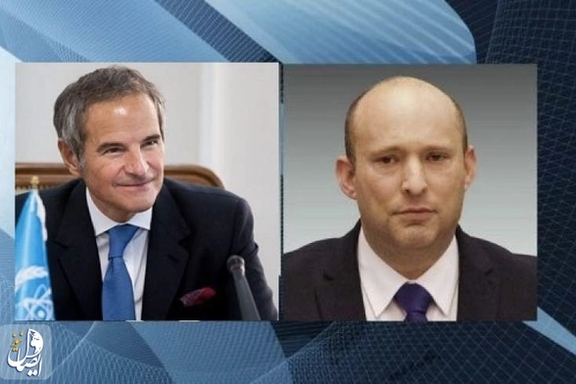Iran Takes Issue With UN Nuclear Chief’s Welcome In Israel

Iran’s official news agency IRNA said Friday the UN nuclear chief’s visit to Israel was among "Zionist" plans against the revival of the 2015 Iran nuclear deal.

Iran’s official news agency IRNA said Friday the UN nuclear chief’s visit to Israel was among "Zionist" plans against the revival of the 2015 Iran nuclear deal.
Israeli Prime Minister Naftali Bennett told Rafael Mariano Grossi, head of the United Nations’ International Atomic Energy Agency (IAEA), in Jerusalem Friday that while Israel wanted a diplomatic resolution to tensions over Iran’s nuclear program it could act independently in “self-defense.”
IRNA said, “destructive actions to put pressure on the West” not to revive the Joint Comprehensive Plan of Action (JCPOA), while year-long talks remain in limbo
IRNA went on to say that Bennett’s words, following this week’s Israeli drills with hundreds of strike aircraft billed as plans for strikes against Iran, were “contradictory.”
Grossi was in Israel in advance of a meeting of the IAEA board scheduled for June 6-10, which is set to discuss the IAEA chief’s recent report saying that Tehran has failed to give satisfactory responses to agency queries over its nuclear work before 2003.
Although Israel is one of four countries – alongside India, North Korea, and Pakistan – that has refused to sign the Nuclear Non-Proliferation Treaty (NPT) and is believed to hold over 150 nuclear bombs, Bennett said he supported the IAEA mission as a professional and independent body.
The Israeli premier last week issued documents from 2004-05 purporting to show that Iran used confidental IAEA files to mislead agency inspectors. This fueled reports that the United States or European states might move a resolution critical of Iran at next week’s IAEA board meeting.
The US and Europe have hesitated over the past year in pursuing such a course in fear that it might stymie year-long Vienna talks to revive the 2015 nuclear agreement, the JCPOA (Joint Comprehensive Plan of Action). The 2015 deal limited Iran’s nuclear program but has been exceeded by Iran since 2019, the year after the US left the JCPOA and imposed ‘maximum pressure’ sanctions.
‘Sunset clauses’
Israel reportedly this week presented the US with a plan to extend the JCPOA indefinitely by scrapping the ‘sunset clauses’ that limit most restrictions on Iran’s nuclear program to ten or 15 years. Should Iran refuse, Israel recommends imposing sanctions still tougher than the current ones.
No Iranian government has shown any inclination to agree to such terms unilaterally, and leaders have expressed defiance in the face of Israeli threats of military action.On Thursday, Iran's chief nuclear negotiator, Ali Bagheri Kani, told Norway’s NRK that Israel “can only attack Iran in its dreams.” Bagheri Kani said that if Israelis had such a dream “they will never wake up from it.”
China criticized Thursday any plans to censure Iran at the IAEA board, which it said would undermine continuing efforts to salvage the JCPOA. The IAEA recent reported that Iran’s stockpile of uranium enriched to 60 percent, near the level requited for a crude weapon, has risen in three months by 10kg (22lb) to reach43.3kg (95lb). Tehran has long denied any intention of developing an atomic arsenal.